Authors
See-Won Byun

See-Won Byun is an assistant professor of international relations at San Francisco State University. Her research centers on Chinese politics and international relations in Asia. She focused on US-Asia policy issues as a research associate at The Asia Foundation’s Center for US-Korea Policy in Washington, and non-resident Kelly Fellow of Pacific Forum CSIS. Before joining SF State, she taught Asian politics and international relations at Bates College. She received a Ph.D. in political science and M.A. in international affairs from The George Washington University, an M.A. in international studies from Yonsei University, and B.A. in economics from Brown University.
Articles by See-Won Byun
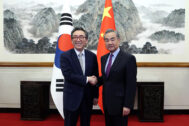
China - Korea
May — December 2024China and the Two Koreas’ Triangular Games
A rebound in China-ROK diplomacy raised optimism after a slow start to 2024, paving the way for the summit between Xi Jinping and Yoon Suk Yeol on Nov. 15. They met on the sidelines of APEC Peru before attending the G20 summit in Brazil. Foreign Ministers Wang Yi and Cho Tae-yul met in Beijing on May 13, facilitating the China-ROK-Japan trilateral summit and Yoon’s meeting with Premier Li Qiang in Seoul. As China-DPRK exchanges dwindled compared to the first third of this year, Xi Jinping and Kim Jong Un’s summits with Putin in May and June raised questions about the direction of China’s Korea policy. Donald Trump’s reelection in November intensified debate on the regional security and economic implications of US-China competition.
New Momentum in China-South Korea Partnership?
ROK Foreign Minister Cho Tae-yul’s May 13-14 visit to Beijing set a positive tone for this year’s high-level exchanges. It marked his first face-to-face talks with Foreign Minister Wang Yi since taking office in January, and the first visit to China by a ROK foreign minister since 2017. Cho raised hopes for a “new phase” of sustainable cooperation, “fostering mutual trust rather than solely focusing on the speed and volume of the development of the bilateral relationship.” They recognized space for further expanding economic cooperation, and agreed to boost local government and societal exchanges to improve mutual public perceptions. Setting up Yoon’s summits with Chinese Premier Li Qiang and Japanese Prime Minister Kishida Fumio in Seoul later that month, South Korea’s foreign ministry concluded the ministers’ meeting “created a new momentum for the development of the Korea-China relationship.”
President Yoon met Premier Li on May 26 in Seoul, a day before trilateral talks with Prime Minister Kishida. While focused largely on economic priorities, a key outcome of Yoon-Li talks was the reactivation and expansion of strategic communication channels. They agreed to create the Foreign Policy and Security Dialogue between foreign and defense ministries, after the halting of similar mechanisms a decade ago. Initiated on June 18 in Seoul, the “2+2” meeting was led by China’s Vice Foreign Minister Sun Weidong, Deputy Director of the Central Military Commission’s Office for International Military Cooperation Zhang Baoqun, South Korea’s Vice Foreign Minister Kim Hong Kyun, and Director General of the PRC Defense Ministry’s International Policy Bureau Lee Seung-buhm. It facilitated separate talks between Sun and Foreign Minister Cho. Cho met China’s vice Foreign Minister Ma Zhaoxu on July 24 in Seoul, where Ma and Korean counterpart Kim Hong-kyun led the 10th China-ROK high-level strategic dialogue, last held virtually in December 2021. ASEAN forums in Laos allowed foreign ministers Wang Yi and Cho Tae-yul to meet again on July 26 to reaffirm active progress in enhancing bilateral dialogue.
China and South Korea’s 9th trilateral summit with Japan on May 27 was highly anticipated after a four-year suspension. This year’s summit marked the 25th anniversary year of China-ROK-Japan cooperation stemming from the ASEAN+3 mechanism. Making “our bilateral relations and trilateral cooperation mutually reinforcing” topped Li’s five-point proposal, extending to trade, innovation, cultural exchange, and sustainable development. China’s foreign ministry stressed the summit’s “highly meaningful” value symbolizing a “new start” for trilateral cooperation. Supporting the Yoon administration’s optimistic reviews, Korean public opinion praised the summit’s significance for Northeast Asian security, the “central theme” of China-ROK ties, and overall “progress” despite China’s “different tone” on North Korea. The 8th trilateral business summit was held alongside the leaders’ meeting, hosted by the China Council for the Promotion of International Trade, Korea Chamber of Commerce and Industry, and Japan Business Federation.
The Xi-Yoon November summit renewed high-level support for developing the China-ROK “strategic cooperative partnership” in security, economic, and cultural fields. Xi and Yoon last met in November 2022 on the sidelines of the G20. China’s foreign ministry emphasized joint commitments to “the original intention of establishing diplomatic relations” despite “many changes” in the international environment since 2022. Yoon reiterated his vision for building a partnership based on “mutual respect, reciprocity, and common interests.”
Friction Points: Third Parties and Internal Affairs
The resurgence of China-ROK diplomacy from May failed to mask enduring strategic challenges. This year’s earlier lull in contacts magnified US-China competition and Yoon’s US-ROK alliance focus constrained the China-ROK partnership. For South Korean skeptics, besides agreeing to hold a good trilateral summit and intensify bilateral meetings, Foreign Ministers Wang and Cho in May “merely said what they wanted to say in diplomatic ways.” According to Yun Sun at the Stimson Center, Beijing’s primary motive for the trilateral summit was to “counterbalance US influence.” Featuring interviews with China’s Korea experts Zhang Huizhi at Jilin University and Da Zhigang at Heilongjiang Academy of Social Sciences, Chinese state media warned Japan and South Korea “should not lose their own interests following US’ suppression of China.” South Korea’s trilateral vice foreign ministerial meeting with US and Japanese allies right after the China-ROK-Japan summit was disappointing news indicating “Seoul’s diplomatic immaturity” and “hasty declaration of loyalty,” according to state think tank scholars like Dong Xiangrong.
Competing views of third-party actors, and interference in each other’s internal affairs, resurfaced in China-ROK diplomatic interactions. In Peru, Yoon held trilateral talks with Biden and Kishida the same day he met Xi. Launching a new Trilateral Secretariat, they renewed their 2023 Camp David pledges on Indo-Pacific and South China Sea maritime security, and Taiwan. South Korean media attention on November’s multilateral summits focused on Seoul’s quest to build global support on Korean security, and “free and fair trade” as host of APEC 2025. As Yoon’s key advisor Kim Tae-hyo reported after the Xi-Yoon summit, Yoon expressed hopes for cooperation with China “in response to North Korea’s repeated provocations, the war in Ukraine and military cooperation between Russia and North Korea.” While jointly applauding the “vitalization of bilateral exchange and cooperation in various areas,” Foreign Minister Cho told Vice Minister Ma in July, “North Korea’s continued provocations and its close ties with Russia are seriously threatening peace and stability on the Korean Peninsula and in the international community.” Although Cho communicated similar concerns to Wang in May, Foreign Minister Wang reaffirmed China’s “unchanged” Korea policy and “constructive role” on the peninsula.

Figure 1 Chinese Foreign Minister Wang Yi, also a member of the Political Bureau of the Communist Party of China Central Committee, holds talks with Cho Tae-yul, foreign minister of the Republic of Korea (ROK), in Beijing, capital of China, May 13, 2024. [Photo/Xinhua]
The Implications of Xi and Kim’s Summits with Putin
Beijing-Pyongyang high-level communication was limited to Xi and Kim’s exchange of anniversary messages on the DPRK’s founding in September and on PRC-DPRK diplomatic ties in October. Their bilateral summits with Putin in May and June raised more important implications for China-Korea relations. To commemorate the China-DPRK Friendship Treaty in July, the DPRK Embassy in Beijing hosted the foreign affairs chairman of the Chinese People’s Political Consultative Conference, He Ping. The lower level of DPRK representation at the Chinese Embassy reception compared to last year’s anniversary sparked speculation about the impact of Pyongyang’s cooperation with Russia. South Korean media in July interpreted various signs of widening division, including Beijing’s push to return DPRK workers in China in line with UN resolutions, its tightened monitoring of bilateral trade, and Kim Jong Un’s reported directive to China-based diplomats to “ignore China.” Pyongyang’s immediate denunciation of the May 27 China-ROK-Japan statement, coinciding with a failed satellite launch that night, raised similar speculation, reinforced by Beijing’s less explicit triangular alignment with Russian and DPRK allies.
Putin’s June 18-19 visit to Pyongyang for his historic summit with Kim raised China’s dilemma of managing historically-strained ties with North Korea and Russia, as 2024 marked the 75th anniversaries of China’s ties with both allies. In a July 23 Yonhap interview, DPRK defector and former diplomat Ri Il-gyu explained Pyongyang’s “estranged” ties with China since late 2022: “For North Korea, it is not a top priority to recover its ties with China. The North’s primary goal is to elicit the maximum benefit from Russia and map out its strategies to brace for Trump’s possible return…North Korea believes China does not make it live well, but it also thinks Beijing would not let it die of hunger.” The Putin-Kim summit’s timing with China-ROK 2+2 strategic talks on June 18 prompted China’s foreign ministry to assure that dialogue plans with Seoul have “no particular link to other countries.” Some observers saw the Putin-Kim summit as an opening for “Seoul-Beijing détente,” concluding “South Korea’s cooperation with China may prove to be more significant than Russia’s support for North Korea.” A JoongAng Daily editorial argued, such a scenario for Seoul first requires “exploiting Beijing’s concerns about its weakening leverage on Pyongyang and repercussions of a strengthened unity of the West,” before responding with the United States and other allies. At a June 17 Wilson Center forum, NATO Secretary General Jens Stoltenberg, who met President Yoon in Washington a month later, noted the growing importance of transatlantic cooperation with Indo-Pacific partners.
Xi’s summit with Putin on May 16 in Beijing, and Pyongyang’s ballistic missile test a day later, heightened skepticism about deterring North Korean aggression through UN sanctions. The meeting was even more disappointing for South Koreans in light of Foreign Minister Cho’s May 13-14 visit to Beijing, raising calls for South Korea’s own nuclear development or “NATO-style” cooperation. DPRK missile tests from May included a new record-setting Hwasong-19 intercontinental ballistic missile test on Oct. 31, Pyongyang’s 11th ICBM launch since 2021. While pointing to “large loopholes” in the global sanctions regime, ROK Ambassador to the UN Hwang Joon-kook called the test a move “to distract the world’s attention from its troops in Russia, demonstrate themselves as larger than life, or gain diplomatic leverage amid the US presidential election.” PRC Ambassador Fu Cong traced the peninsula security problem to a lack of US-DPRK “mutual trust,” and blamed US military expansion for threatening Chinese and regional security.
Talks between PRC and ROK nuclear envoys Liu Xiaoming and Lee Jun-il on the sidelines of the Northeast Asia Cooperation Dialogue in Tokyo on May 9 released no results. As Troy Stangarone at the Korea Economic Institute indicated, the April expiration of the mandate for the UN Panel of Experts on North Korea called into question the future of nuclear diplomacy. At a post-US election forum in Seoul, Trump’s former envoy Joseph Yun anticipated that Kim Jong Un is unlikely to resume denuclearization talks with Washington given stronger DPRK capabilities and Russian support.
China-ROK Economic Diplomacy and Trade Reset
China regained its position as South Korea’s biggest export market in January-July after ROK exports to the United States surpassed China’s share in April-June 2023. A 38% decline in memory chip exports to China last year contributed to South Korea’s first trade deficit with China since 1992. By December 2024, a recovery in semiconductor exports injected more optimism into South Korea’s trade performance. But the declining rate of ROK export growth from August implied longer-term concerns.

Figure 2 Finance Minister Choi Sang-mok speaks during the 18th Korea-China Meeting on Economic Cooperation held virtually with Zheng Shanjie, chairman of China’s National Development and Reform Commission, on May 16, 2024, in this photo provided by the Ministry of Economy and Finance. (PHOTO /Yonhap)
Agreements between President Yoon and Premier Li in May included the launching of a senior-level trade dialogue, resumption of the 2nd phase of FTA talks to promote the services sector, and revival of a bilateral investment cooperation committee after a 13-year pause.
The latest meeting of trade officials on Nov. 28 in Yancheng supported such priorities and facilitated a China-ROK business forum on the sidelines to explore new opportunities. Supply chain stability remained a top focus of bilateral economic diplomacy from May. China’s National Development and Reform Commission chairman Zheng Shangjie and ROK Finance Minister Choi Sang-mok led the 18th China-ROK Meeting on Economic Cooperation online on May 16. Choi pointed to a critical time for managing supply chains to “jointly lead the global industry,” citing raw materials and critical minerals, and new industries like clean energy. South Korea’s trade ministry announced new bilateral talks on July 11 “aimed at exchanging opinions on export controls.” The initiative complemented director general-level economic talks in Beijing on July 29, an exchange led by China’s Commerce Ministry and South Korea’s Foreign Ministry since 1993.
Regional Economic Security and Unfair Play
US-China technology competition and China’s e-commerce practices continued to drive China-ROK economic frictions. As US-China “protectionist moves” loomed over South Korea’s export recovery path, the latest exchange of the tightest-yet export controls under Xi and Biden drew mixed responses from South Korea. The trade ministry quickly projected limited repercussions for Korean semiconductors, reassuring the public on Seoul’s close coordination with Washington. Korean analysts suggested the barriers to China’s technology advancement could boost South Korea’s competitiveness, but also lower future Chinese demand and raise dependence on the US market. Ahead of US elections, a Korea Herald editorial summarized worsening fears in the shifting chip market: “Previously, roles were clearly assigned: the US led chip design; Europe excelled in related equipment; Korea and Taiwan spearheaded chip production for the global market; and China consumed the final chip products. This old chip production structure is now expected to undergo a wave of drastic changes now that the US is pivoting to “friendshoring” to keep China’s technology advance at bay.”

Figure 3 President Yoon Suk Yeol (R) and Chinese Premier Li Qiang pose for a photo during their meeting at the presidential office in Seoul on May 26, 2024. (PHOTO /Yonhap)
Such structural shifts framed Beijing and Seoul’s clashes over economic security and coercive diplomacy since the 2016-2017 THAAD dispute. During June 2+2 talks, Chinese officials opposed “turning economic issues into political or security ones,” and “all forms of trade protectionism.” ROK Industry Minister Ahn Duk-geun joined US and Japanese partners a week later in Washington to launch trilateral cooperation addressing “a wide range of non-market policies and practices” and “the weaponization of economic dependencies on certain supply sources for strategic goods.” South Korean opinion in May focused on the heightened need to manage mineral import reliance given “China’s strategic use of its core material resources as a geopolitical tool.”
Frictions over “unfair” practices also heated up in e-commerce. South Korea’s Fair Trade Commission (FTC) announced on May 13 the signing of voluntary agreements with AliExpress and Temu to address hazardous Chinese products and protect Korean consumers. By late November, the FTC ordered the online retailers to revise terms and conditions violating Korean legal standards on personal data protection and consumer compensation. Online purchases from China drove an annual 28% growth in direct overseas purchases by Korean consumers to 6.8 trillion won ($4.9 billion) in 2023, when China represented half of South Korea’s total overseas purchases. But the volume of user complaints about product quality and services has soared with China’s rapid expansion into the Korean market.
Against such consumer frustrations, the Xi-Yoon summit highlighted China’s granting of visa-free entry to South Koreans in early November, its first such move since 1992, as an immediate indicator favoring friendship through cultural exchanges. Xi “especially” welcomed more youth exchanges, and expressed hopes for more steps to boost China-ROK travel from the Korean side. Foreign Minister Cho also told Wang in May that freer access to cultural content would “help bridge the emotional gap between the youths of the two countries.” But China’s recent visa exemption drew cautious reactions in South Korea amid geopolitical uncertainties. While some supported the effort to mitigate recent strain, skeptics called China’s “sudden visa waiver” a strategic act to counter US influence, called for Seoul’s “prudent diplomacy,” and cautioned that reciprocal benefits to China require balancing economic gains and “less than favorable” public attitudes.
Resumption of China-DPRK Trade and Repatriation

Figure 4 President Yoon Suk Yeol (L) shakes hands with Chinese President Xi Jinping during their meeting at a hotel in Lima, Peru, on Nov. 16, 2024, on the sidelines of the Asia-Pacific Economic Cooperation summit. (PHOTO /Yonhap)
Post-pandemic reopening and increased trade with China and Russia drove North Korea’s economic recovery, as South Korean data showed in July. After negative economic growth from 2020, North Korea marked 3% growth in 2023, a doubling of exports to $0.33 billion, and 71% growth in imports to $2.44 billion. Trade with China constituted 83% of total DPRK trade last year. As the Korea Institute for International Economic Policy indicated in March, although remaining below 2018-2019 pre-pandemic levels, trade with China grew by more than 120% in 2023 to $2.29 billion, including $2 billion in imports and $0.29 billion in exports. Friendship Year initiatives also supported the resumption of China-DPRK people exchange. Student exchange programs resumed with the arrival of more than 80 PRC government scholarship and self-funded students in North Korea by May. The Chinese students represented the first foreign students to enter the country since North Korea’s August 2023 border reopening.
Global attention sharpened most importantly on China’s resumption of the forced repatriation of DPRK defectors, identified as illegal “economic immigrants.” Seoul repeated its requests for Chinese support though this year’s high-level meetings. In May, Foreign Minister Cho shared “domestic and international concerns” with Wang Yi, calling for “China’s special attention and cooperation to ensure that North Korean defectors are not repatriated against their will.” Seoul continued to push the human rights issue on the UN Security Council agenda by linking Pyongyang’s weapons development and human rights violations. ROK Ambassador Hwang Joon-kook said at a June 12 meeting: “If human rights violations stop, nuclear weapons development will also stop…This is why we need to look at the DPRK human rights situation from the perspective of international peace and security.” As Security Council president that month, he also delivered a joint statement by 57 UN member-states and the EU delegation calling for stronger collaborative action. China’s deputy representative Geng Shuang maintained that the UN Security Council “should not intervene in country-specific human rights issues…We’ve always opposed the politicization of human rights issues or using human rights as a pretext to exert pressure on other countries.”
Amid Seoul’s China-ROK-Japan summit preparations in May, various reports on China’s repatriations raised public calls for stronger diplomacy. A May 7 Korea Times editorial argued China “should pay more attention to improving its global reputation” as a UN Security Council permanent member and “major trading nation,” and called on the Yoon government to “adopt a more assertive approach and urge China to cease such improper actions.” Recent trends extend pessimism on Chinese cooperation. North Korea’s growing isolation poses a key challenge to South Korea’s rising activism, as Seoul’s UN Human Rights Office representative James Heenan indicated in May. Reports in June of North Korea’s construction of walls within the Demilitarized Zone affirmed views of tightening regime control against external influences. At a July CSIS event, ROK Unification Minister Yung Ho-kim pointed to the rising forces of South Korean popular culture against the DPRK regime’s juche culture of self-reliance, to promote cultural tools of influence. Such engagement strategies raised Chinese unease over threats to DPRK sovereignty. Citing President Yoon’s Oct. 9 Singapore Lecture on unification, Wang Junsheng at the Chinese Academy of Social Sciences criticized Yoon’s intensified “ideological offensive” “to influence DPRK citizens” as a leading driver of escalating peninsula tensions.
The 75th anniversary year of China-DPRK relations heightened Beijing’s challenge of promoting its global image while also consolidating its traditional friendship with Pyongyang. Mounting global criticism last year, in response to China’s October 2023 repatriation of more than 500 DPRK defectors, raised hope for constraining China’s actions. In August, the UN Human Rights Council Working Group on Arbitrary Detention urged China and North Korea to take steps to address the issue, after finding the case to be an “arbitrary deprivation of liberty” violating human rights norms. As Human Rights Watch reported in May, Beijing has detained more than 90 North Koreans since January, and forcibly repatriated more than 670 since Pyongyang’s 2020 border closure. China’s repatriation of about 60 North Koreans from Jilin and Liaoning on April 26, two weeks after China’s top legislator Zhao Leji met Kim Jong Un in Pyongyang, affirmed fears of increased repatriations.
Post-2025 Prospects for China-Korea Relations
Beijing-Seoul dialogue efforts this year recharged their “strategic cooperative partnership” forged in 2008 under Hu Jintao and South Korea’s conservative Lee Myung-bak administration, intended to expand ties to regional and global levels. China’s Korea watchers saw “multiple positive signals” this year of Yoon’s shifting China policy “beyond bilateral significance.” South Korea’s hosting of APEC 2025 raises much anticipation over a possible visit by Xi Jinping next year. But even Korean advocates of practical diplomacy cautioned, “President Yoon needs to moderate the speed of getting along with China” given the “mishaps” of previous administrations since Park Geun-hye, whose engagement with Xi from 2013 yielded a short-lived peak in partnership. Advancing the China-ROK partnership will require maintaining state and public diplomacy initiatives, delinking regional economic and security strategies, and avoiding discursive clashes on ideological differences.
The November election of Trump marked a critical juncture in China-Korea relations. On the security front, supporters of thawing China-ROK relations after the Xi-Yoon summit suggested “strengthening ties with Beijing could serve as a hedge against potential disruptions in the US-South Korea alliance.” Yoon’s media remarks on the G20 sidelines, indicating that relations with China and the United States is not “a case of choosing one country or the other,” signaled a major shift in his US alliance-centered foreign policy. While cautioning against “third party” influences, PRC Ambassador Xing Haiming in May agreed that “South Korea’s efforts to develop ties with the US, and also with China, do not go against one another.” Sharpened by the Xi-Putin summit, Yoon’s domestic criticism in May already projected an “inevitable” policy turn raised by voices favoring a “balanced” security approach. The June Kim-Putin summit raised Beijing and Seoul’s shared unease about Pyongyang’s tightening military ties with Russia. But the impending return of Trump’s “America First” revealed deeper South Korean anxieties about “choosing sides” on key priorities like Taiwan, and the security risks posed by Trump’s hardliners on China for resolving the North Korean nuclear issue.
The downward adjustments in South Korean growth projections after Trump’s November election reflected even stronger pessimism about the risks from US economic policy. As the presidential office reported after assessing the potential impact of Trump’s tariff plans, “A decline in China’s exports to the U.S. could affect Korea’s intermediate goods exports to China and may also intensify competition in third-country markets.” Korean public opinion captured the worsening economic outlook featuring ripple effects from US protectionism, the direct trade impact of technology restrictions on China, and wider repercussions from Chinese economic slowdown. From such perspectives, US-China competition dampens South Korea’s export drive if it is “forced to join a messy trade battle.” The Korea International Trade Association identified Trump’s tariff threats as the biggest risk facing ROK export recovery. A South Korean survey found that more than 80% of Korean companies expect Trump’s protectionist policy to hurt the Korean economy, while less than 8% think his China policy would benefit it. Such pessimism is amplified by an increasingly challenging foreign investment environment in China, where ROK direct investment dropped by 78% in 2022-2023 to $1.87 billion. One scholar affirmed in November, “China is country where political logic is strong…one cannot merely trust China as a business partner based purely on economic logic.”
Regaining trust at both state and societal levels remains a top priority for Beijing and Seoul. During his June meeting with former ROK Prime Minister Lee Hae-chan in Beijing, Wang expressed hopes for Korean efforts “to promote a correct understanding of China in the ROK society.” As South Korea’s Ambassador to China Chung Jae-ho argued in 2012 during the transition to China’s Xi era, “the wealthier and stronger China becomes, the larger the perceptual disparity may grow between China and its regional neighbors, including South Korea.” South Korea’s internal political turmoil compounds the geopolitical and economic risks from US-China competition under Trump. While Beijing declined commenting on Korean “domestic affairs,” the Chinese state media saw Yoon’s Dec. 3 imposition of martial law as a sign of “serious divisions in ROK politics.”
In conclusion, I want to thank Rob York, Brad Glosserman, Ralph Cossa, Carl Baker, and especially Scott Snyder for the valuable opportunity to contribute to Comparative Connections since 2008.
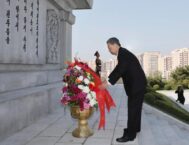
China - Korea
January — April 2024New Chapters, Old Dilemmas
China-ROK relations reached critical junctures across political, security, and economic fields. China-ROK relations had a bad start in 2024 with discord over regional security priorities. The inaugural US-Japan-ROK Indo-Pacific Dialogue in Washington on Jan. 5, a deputy foreign minister-level initiative emerging from the August 2023 Camp David summit, reignited frictions with Beijing. The resulting tensions constrained anticipation about their own trilateral summit with Tokyo. The shifting China-ROK trade structure and Chinese e-commerce practices emerged as central points of economic debate.
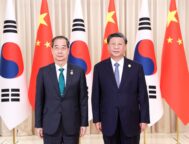
China - Korea
September — December 2023A Subdued Environment and Missed Opportunities
Chinese diplomacy toward the Korean Peninsula in late 2023 sputtered forward, driven more by a calendar of bilateral anniversaries with North Korea and multilateral gatherings involving South Korea than any sense of strategic purpose. Both relationships seemed preoccupied with off-stage developments such as the September summit between Kim Jong Un and Vladimir Putin and the momentum of US-Japan-South Korea trilateral relations, rather than any inherent dynamism of their own. Still, regular Sino-North Korean bilateral exchanges ahead of the 75th anniversary of the bilateral relationship and Sino-South Korean bilateral economic dialogues provide opportunities to overcome resistance and sustain progress in the face of deepening major power rivalries. Senior-level dialogues between China and North Korea occurred on North Korea’s 75th founding anniversary in September, with the visit of Chinese Vice Premier Liu Guozhong to Pyongyang, a visit that occurred against the backdrop of the second US-South Korea Nuclear Consultative Group meeting, North Korea’s first successful indigenous satellite launch, and North Korean Vice Foreign Minister Pak Myong Ho’s visit to Beijing.
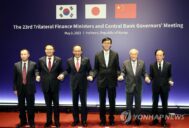
China - Korea
May — August 2023Economic Security Dilemmas
PRC Ambassador to South Korea Xing Haiming’s public statement in June sharpened Beijing-Seoul frictions following President Yoon Suk Yeol’s Taiwan remarks in an April interview, sparking mutual accusations of interference in internal affairs. Multilateral engagements offered opportunities to reaffirm China-ROK relations through bilateral talks between China’s Commerce Minister Wang Wentao and South Korea’s Trade Minister Ahn Duk-geun (May), Defense Ministers Li Shangfu and Lee Jong-sup (June), Foreign Ministers Wang Yi and Park Jin (July), Finance Ministers Liu Kun and Choo Kyung-ho (July), and Trade Ministers Wang Shouwen and Ahn (August). The revival of high-level exchanges, Beijing’s lifting of travel restrictions on South Korea in August, and North Korea’s border reopening that same month are sources of optimism in China-Korea relations despite overarching tensions. Discord remains on regional security priorities, South Korea’s overt alignment with the United States under the Yoon administration, and the escalating US-China technology war. Meanwhile, Chinese and Russian delegations joined Kim Jong Un in Pyongyang to celebrate the 70th anniversary of the end of the Korean War, reflecting the shape of North Korea’s first post-COVID diplomatic activity.
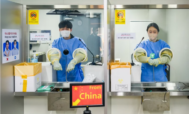
China - Korea
January — April 2023Deepening Suspicions and Limited Diplomacy
China and South Korea began 2023 with the temporary imposition of tit-for-tat restrictions by both governments on travel to the other country after China lifted its zero-COVID policy. Although the restrictions proved temporary, they pointed to the reality of a sustained downward spiral in China-South Korea relations accompanied by increasingly strident public objections in Chinese media to the Yoon Suk Yeol administration’s steps to redouble South Korean alignment with the United States regarding Indo-Pacific strategy, supply chain resiliency, and shared values. South Korean Minister of Foreign Affairs Park Jin’s congratulatory call to newly appointed Chinese Minister of Foreign Affairs Qin Gang on Jan. 9 was one of the few positive senior-level interaction between the two countries in early 2023; by the end of April, the main diplomatic interactions between China and South Korea had devolved into a dueling exchange of private demarches and public assertions that the other side had committed a “diplomatic gaffe.”
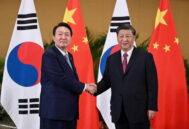
China - Korea
September — December 2022Kim Jong Un Tests Xi-Yoon Diplomacy
Regional and global summits presented high-level platforms for China-South Korea engagement in November. The summitry showed that the relationship had returned with solidity with the resumption of international meetings and in-person exchanges. Although the Xi Jinping and Yoon Suk Yeol leaderships advanced diplomatic exchange, concerns emerged over enduring political and security constraints and growing linkages with the economic relationship. Kim Jong Un’s escalation of military threats, through an unprecedented number of missile tests this year, challenged Xi-Yoon bilateral and multilateral diplomacy. China-North Korea bilateral interactions, while brisk, primarily relied on Xi and Kim’s exchange of congratulatory letters around significant founding anniversaries, China’s 20th Party Congress, and expressions of condolences after the death of former Chinese leader Jiang Zemin. The UN Security Council’s failure to take unified action on DPRK threats prompted South Korea to voice frustration with China and expand cooperation with US and Japanese partners. Such responses only reinforced concerns raised in recent leadership exchanges, and Korean domestic division over Yoon’s diplomatic strategies.
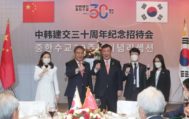
China - Korea
May — August 2022A Muted 30-Year Anniversary
Beijing and Seoul marked 30 years of diplomatic ties on Aug. 24 as South Korea transitioned to a new administration under President Yoon Suk Yeol, who took office in May. Although early high-level exchanges reaffirmed partnership, the two leaderships confront growing pressures from US-China competition, economic uncertainty, and public hostility. Domestic priorities in China in light of the 20th Party Congress and South Korea’s shift to conservative rule amplify these concerns. The impact of US-China rivalry on the China-South Korea relationship extends from security to economic coordination, including approaches to THAAD and global supply chains, and export competition, especially in semiconductors, challenges new Xi Jinping-Yoon economic agreements. Moreover, public hostility is strongest among South Korea’s younger generation, raising pessimistic prospects for future China-South Korea ties.
Despite mixed signals, false starts, and the continued absence of leader-level meetings marking the recovery of economic ties between China and North Korea, geopolitical developments have pushed the two countries closer together. Such engagement features mutual reinforcement of each other’s positions on issues of vital interest and solidarity in response to US policies.
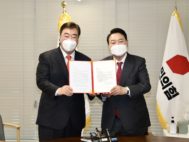
China - Korea
January — April 2022Beijing Olympic Tensions, North Korea’s Testing Spree, and South Korea’s New Conservative Leadership
The first four months of 2022 marked a turn toward difficult terrain in the China-South Korea relationship, including the challenge of managing conflicting expressions of patriotism during the Beijing Olympics. The Olympics opening ceremonies were attended by National Assembly Speaker Park Byung-seug, South Korea’s second-highest-ranking official by protocol, despite the US imposition of a “diplomatic boycott.” North Korea’s dozen missile tests since January 2022 included a “new” ICBM launch in March ahead of the 110thanniversary of Kim Il Sung’s birth and Yoon Suk-yeol’s presidential inauguration. The latest tests drove China-South Korea dialogue, new US sanctions, and reassertions from Beijing that US actions remain the decisive factor in resolving the peninsula problem. Beijing’s hosting of the Olympics and Pyongyang’s commemorations of Kim anniversaries presented opportunities for jointly reaffirming China-North Korea friendship. Despite signs of rebounding economic activity after the resumption of cross-border freight train operations in January, China’s COVID-19 lockdowns remain a source of uncertainty.
South Korea’s election of pro-US opposition candidate Yoon Suk-yeol generated a mixture of anxiety and veiled warnings from Chinese commentators. Chinese President Xi Jinping’s call to Yoon two weeks following the election was hailed as an unprecedented gesture of respect from a Chinese leader to an incoming South Korean president. But Yoon’s first congratulatory calls after his electoral victory were from Quad members as well as the United Kingdom, reflecting a distinct South Korean tilt toward the United States amid the China-US strategic rivalry. Yoon’s campaign platform posited a positive-sum relationship between his pledges to restore a “comprehensive strategic alliance” with the United States and to establish relations with China built on “mutual respect.” But it remains to be seen how Beijing will respond to the Yoon administration’s shift toward an unambiguous alignment with the US.
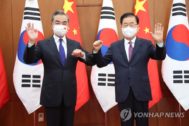
China - Korea
September — December 2021Economic Stabilization, End-of-War Declaration, and the Ongoing “Joint Struggle”
During the waning months of 2021, China and South Korea worked together to stabilize and strengthen their economic relationship and the Moon administration reached out to China as part of its full-court press to achieve an end-of-war declaration prior to the end of Moon’s term in May of 2022. Through several foreign minister-level meetings between Chung Eui-young and Wang Yi, including Wang’s visit to Seoul for a meeting with President Moon, an exchange held in Tianjin between national security advisors, and regular bilateral economic consultations, the two countries improved economic cooperation and sustained close consultation on peninsula-related issues. The most significant outcomes of these discussions included the first release of a major Korean movie in Chinese theaters since 2015 and ongoing efforts to bilaterally support the digital, technological, and climate change dimensions of Sino-South Korean economic cooperation. China offered support for Moon administration efforts to end the Korean War through pursuit of phased and synchronized actions and discouraged relevant countries from taking destabilizing unilateral moves.
Meanwhile, North Korea’s missile tests in September-October frustrated hope for regional diplomacy as Beijing and Pyongyang jointly commemorated their 72-year-old “joint struggle to defend and glorify socialism” by marking national and bilateral anniversaries. Their official statements, however, lacked substantive outcomes in China-DPRK diplomatic exchanges. Post-pandemic trade remained stalled as both leaderships turned to self-reliance in their national development strategy.
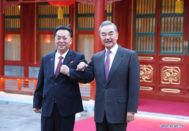
China - Korea
May — August 2021Alliance Restoration and Summit Commemorations
South Korea President Moon Jae-in’s meeting with Joe Biden and his participation in the G7 summit during May and June focused attention on Seoul’s strategy of balancing relations with China and the United States. While Beijing disapproved of the US-ROK joint statement released after the May summit, Chinese state media praised the Moon administration’s relative restraint in joining US-led coalition-building against China. Official remarks on core political and security issues, however, raised mutual accusations of interference in internal affairs. US-China competition and South Korean domestic political debates amplify Seoul’s dilemma regarding its strategic alignment ahead of the country’s 2022 presidential elections.
The China-North Korea relationship turned to commemorative diplomacy regarding summit meetings between Kim Jong Un and Xi Jinping in 2018 and 2019 in the absence of new meetings in 2021. Kim offered hearty congratulations to Xi on the occasion of the 100th anniversary of the founding of the Chinese Communist Party and both sides affirmed the value and historic contributions of the Sino-DPRK Treaty of Friendship, Cooperation, and Mutual Assistance on the occasion of the 60th anniversary of the signing of the treaty in 1961. Political messages underscoring China-North Korean strategic alignment included a North Korean statement affirming shared strategic priorities regarding both the US military withdrawal from Afghanistan and Chinese statements criticizing the continuation of annual US-South Korean military exercises in the context of rising China-US strategic rivalry.